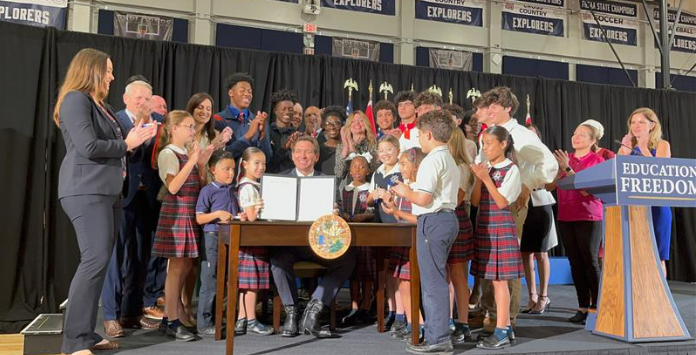
On this episode, reimaginED senior writer Lisa Buie talks with Doug Tuthill and Amy Graham of Step Up For Students, the nation’s largest K-12 education choice scholarship funding organization. Tuthill is president of Step Up, and Graham is vice president of policy, innovation and empowerment for the Florida-based organization. Step Up For Students administers most of the education choice scholarships in Florida and hosts this blog.
“The fantastic thing about (education savings accounts) is they’re very flexible, and we’re all about customization. And this whole ed choice movement is about giving families more flexibility to be able to customize an education for their child. And I think the ESA piece, as well as universal eligibility, are really game changers.” – Doug Tuthill, president, Step Up For Students
Tuthill offers an overview of the 40-year history of education choice in the Sunshine State and how district magnet schools gave rise to more options such as charter schools, virtual schools and scholarship programs that allowed parents to decide the best learning environment for their children. Tuthill also discusses the details of the newly signed law HB 1 and how the conversion of traditional scholarship to education savings accounts will give families even greater flexibility in customizing their children’s education. He also clears up misinformation about the expanded program regarding eligibility, costs and equal opportunity. Tuthill also talks about how HB 1 will open up opportunities for educators to start their own innovative programs, further expanding options for students.
Graham discusses regulatory accountability and guardrails built into the bill as well as a new personalized education plan classification for homeschool families who choose to use state funds to completely customize their child’s education. (The law exempts homeschool families who do not wish to accept state funds from certain accountability rules that apply to those in the personalized education program.)
Graham offers details on the new purchasing guide under development that will list pre-approved goods and services to make it easier for families to manage their funds. She also discusses how HB 1 will simplify the evaluation process for non-public school students to qualify for funding through the state’s education savings account program for students with unique abilities. That program also received expanded funding through HB 1 to eliminate a wait list.
Graham also outlines how HB 1 is intended to aid school districts by providing relief from some of their most burdensome regulations so district schools can be competitive options.
EPISODE DETAILS:
- A brief history of education choice in the Sunshine State
- What makes HB 1 one of the most transformative laws in Florida’s public education history
- The difference between universal eligibility and universal access
- Straight talk about the actual costs of HB 1 and how the state’s budget laws prevent out-of-control spending
- Accountability and guardrails in HB 1
- Details about the personalized education program classification and how it opens up more customization options
- The new purchasing guide for parents
- How HB 1 expands opportunities for educators to start their own programs
- How HB 1 will make it easier for district schools to compete amid all the diverse options
RELEVANT LINKS:
https://www.fldoe.org/schools/school-choice/k-12-scholarship-programs/fes/
https://www.stepupforstudents.org/


